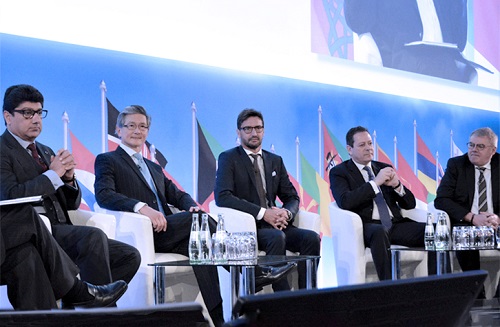✕

Column: industry Tag: hotel industry,global CEO Published: 2017-03-10 11:47 Source: Author:

CEOs from five hotel companies who spoke at the International Hotel Investment Forum this week stressed the importance of differentiation, quality and talent to the modern hotel.
The CEOs added that these three necessities should be supported by expanded loyalty programs and unique food-and-beverage services. Together, these five ideas aren’t anything new, the executives said, but they remain the best way of pushing back against online travel agencies and other disruptors.
“A lot of hoteliers are scared to experiment with current brands, but rather they launch new ones,” said Puneet Chhatwal, CEO of Deutsche Hospitality.
“New thinking is critical. Company culture is critical,” said David Kong, president and CEO of Best Western Hotels & Resorts.
While a focus on quality has always been a top priority in the industry, it has had to share top billing with online distribution initiatives, sources said. But now—perhaps because of the general consensus that hotel companies are losing the fight against OTAs—the onus is back on experiential considerations.
“We have spent much money on online business to compete against OTAs, but now we are focusing on quality and differentiation,” said Pierre-Frédéric Roulot, CEO of Louvre Hotels Group and CEO of Jin Jiang Europe.
Staying true to core values and brand identity was a common theme among the CEOs’ discussion. Panelists said that focus allows hotel companies to attract the brightest talent.
Simon Naudi, CEO of Corinthia Hotels, said a hotel company must “be able to think like an owner and a developer and recruit people with that flexibility.”
Chhatwal added such flexibility allows the growth of unique brands.
The five companies represented on the panel each have backed up these claims. Steigenberger Hotels Group rebranded to Deutsche Hospitality as a repositioning move. Corinthia signed its first third-party hotel management for a Dubai property, and Louvre is continuously adapting to the nature and opportunities of being part of one of China’s conglomerate corporations, Jin Jiang International.
“It is not easy to give up the (Steigenberger Hotels Group) name,” Chhatwal said, referring to last year’s decision to adopt the Deutsche Hospitality parent company name. “Although we have kept the Steigenberger hotel brand name. … We clearly positioned ourselves against our competitors in the domestic market. We broke away at the right moment.”
Louvre’s Roulot said his company will focus much of its energy in the next two years on the “integration of what we have done in the past, certainly in light of increased protectionism in China,” referring to its new owner, Jin Jiang International.
“We’re a bigger company ready for the next cycle,” Roulot added.
The push for scale was not shared by all panelists. Best Western’s Kong championed it, but Stefan Leser, CEO of Jumeirah Group, said Jumeirah, with 22 assets mostly in the Middle East, does not intend to go along that path.
Quality quest
The push to perfect hotels in the eyes of guests includes the need to be in key markets and to tweak loyalty programs to be even more relevant, panelists said.
“It is important to keep assets current, and that also is true of the overall profile. In terms of destinations, it is important for us to grow in China,” Leser said, who added Jumeriah would soon open a property in Nanjing, China.
Naudi said he represented the other smaller company on the stage, and being smaller allowed for quality to be consistent.
“We’re looking at two or three new hotels, acquisitions and HMAs, and outside of Europe,” Naudi said. “We also are very focused on the euro-exchange rate, Brexit and other geopolitical events.”
Each company also continues to drive interest in their loyalty programs as one of their top goals.
“Loyalty remains the best defense against OTAs,” Kong said. “If you do not have loyalty, you cannot compete.”
Leser said that in the luxury space, loyalty programs are not so important, but they exist as a connector to guests and around recognition.
“Four Seasons has a loyalty platform, they just do not call it loyalty,” Leser said.
Chhatwal predicted loyalty is set to change dramatically in the next 20 years or so.
“Loyalty will be just as relevant, as they will be cross-border and cross-industry,” he said. “Who wants 40 or 50 cards in their pockets?”
Reinventing F&B
The CEOs also touched on the topic of hotels improving their F&B offerings.
Chhatwal said F&B will have the biggest upside in his company over the next five years, while Roulot said F&B was another golden way in which to differentiate the overall property product.
“Restaurants provide glamor to hotels, so we have to think of them not as F&B outlets but as restaurants,” Naudi said.
The panel agreed that some work still needs to be done. Naudi said brands must look at new concepts, see what is hip and not be afraid to take chances.
He added hoteliers often regard hotel restaurants as having short shelf lives.
“More than 50% of our revenue comes from F&B, but you have to have the ability to change concepts,” Naudi said. “Do not be scared of closing, changing and then reopening. It does not necessarily have to be an entirely new restaurant.”
Kong said developing strong and unique F&B is tougher in the U.S., where it has long been the case that hotel restaurants are no longer the best restaurants in town.
Previous:Kimpton Hotel Announced for Museum Place in San Jose, California
Next:Holiday Inn Warsaw West Station Announced at International Hotel Investment Forum
Hot key words
Hot Products
Popular Vendors